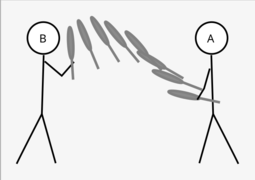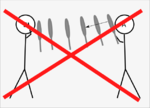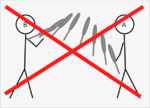Throwing first Zaps: Difference between revisions
No edit summary |
|||
| (13 intermediate revisions by the same user not shown) | |||
| Line 2: | Line 2: | ||
We start out with a slightly slower version, one could also call them "candlestick throws" to make the first patterns easier to learn. It is usually not very hard to make faster throws lateron if needed or wanted. |
We start out with a slightly slower version, one could also call them "candlestick throws" to make the first patterns easier to learn. It is usually not very hard to make faster throws lateron if needed or wanted. |
||
== How to do the Throw == |
|||
* Stand relatively close together. The more distance your throws have to go, the more they will turn without intent. |
* Stand relatively close together. The more distance your throws have to go, the more they will turn without intent. |
||
| ⚫ | |||
[[image:one-zap2.png|thumb]] |
|||
[[image:one-zap3.png|thumb]] |
|||
Ways to make the throw: |
Ways to make the throw: |
||
| Line 16: | Line 11: | ||
* hold the club horizontally and throw it a little bit like a flat (a horizontal no spin throw juggling alone) |
* hold the club horizontally and throw it a little bit like a flat (a horizontal no spin throw juggling alone) |
||
<Gallery mode=packed> |
|||
| ⚫ | |||
image:one-zap.png| zap with club already starting in an upright position |
|||
image:one-zap3.png| zap with a horizontal throw - has to be thrown above shoulder height so partner can catch it |
|||
image:one-zap2.png| what a horizontal throw often turns into - still works good |
|||
</Gallery> |
|||
| ⚫ | |||
Important is that you start the throw with your hand lowered and do the throw upwards. If your motion is fully horizontal, the throw will be much faster and this will make everything much more stressful. Some people even start throwing zaps a little bit downwards, that becomes extremely hard to catch and must be avoided. |
Important is that you start the throw with your hand lowered and do the throw upwards. If your motion is fully horizontal, the throw will be much faster and this will make everything much more stressful. Some people even start throwing zaps a little bit downwards, that becomes extremely hard to catch and must be avoided. |
||
| Line 22: | Line 23: | ||
Start practicing that with your partner. Practice until the throw works ok for you from both hands. Practice straight and also diagonal throws - one partner will have to do only straight throws in the following patterns, the other only diagonal throws. |
Start practicing that with your partner. Practice until the throw works ok for you from both hands. Practice straight and also diagonal throws - one partner will have to do only straight throws in the following patterns, the other only diagonal throws. |
||
| ⚫ | |||
== Common Problems == |
|||
| ⚫ | |||
[[image:one-zap-no1.png|thumb|upright=0.5|club thrown downwards]] |
|||
| ⚫ | |||
* club turns or turns too much |
|||
** Try the throw where you hold the club horizontally. If it turns a little here, the throw is still good |
|||
** Try out differnt ways of holding the clubs and to do the throw until you find one that works for you |
|||
* your partner looks stressed and tries to run away |
|||
** You are not doing your throws from a lowered hand position , but are throwing horizontally or worse, downwards. |
|||
** you are giving the club too much of a push forward instead of upward. The club should not land far behind the partner if they don't catch the club |
|||
** you accientially used knifes or chain saws for your practice session. This is not good practice. Stick to soft plastic clubs. |
|||
== How Long to Practice == |
|||
| ⚫ | |||
Continue practicing as long as you still see a tedency for the club to turn too much - or while you see a tendency for it to turn at all. |
|||
| ⚫ | Note: The throws in this exercise need to be better than what will be needed in the first pattern, because your attention will be on learning the sequence of throws and you cannot give the throw itself your full attention anymore. Come back to this simple throwing exercise for a couple of minutes whenever you notice that your throws become much worse in the pattern. |
||
Next patterns to try |
== Next patterns to try == |
||
* [[ Zap zip zip]] |
* [[ Zap zip zip]] |
||
* [[Zap zap zip]] |
* [[Zap zap zip]] |
||
Latest revision as of 08:29, 17 March 2022
Zaps are fast throws in which the club only does a half turn or flies flat. They are like a normal pass caught by someone standing in the middle between two passers doing normal passes - before the club really turned or gained much height.
We start out with a slightly slower version, one could also call them "candlestick throws" to make the first patterns easier to learn. It is usually not very hard to make faster throws lateron if needed or wanted.
How to do the Throw
- Stand relatively close together. The more distance your throws have to go, the more they will turn without intent.
Ways to make the throw:
- hold the club upright and relatively close to the middle and then throw the club by giving it a lift and a push forward.
- hold the club horizontally and throw it a little bit like a flat (a horizontal no spin throw juggling alone)
Look at the pictures - I would consider all of these ok. The last one lets B catch a horizontal club - this only works if the club goes above shoulder height of B.
Important is that you start the throw with your hand lowered and do the throw upwards. If your motion is fully horizontal, the throw will be much faster and this will make everything much more stressful. Some people even start throwing zaps a little bit downwards, that becomes extremely hard to catch and must be avoided.
Start practicing that with your partner. Practice until the throw works ok for you from both hands. Practice straight and also diagonal throws - one partner will have to do only straight throws in the following patterns, the other only diagonal throws.
Common Problems
- club turns or turns too much
- Try the throw where you hold the club horizontally. If it turns a little here, the throw is still good
- Try out differnt ways of holding the clubs and to do the throw until you find one that works for you
- your partner looks stressed and tries to run away
- You are not doing your throws from a lowered hand position , but are throwing horizontally or worse, downwards.
- you are giving the club too much of a push forward instead of upward. The club should not land far behind the partner if they don't catch the club
- you accientially used knifes or chain saws for your practice session. This is not good practice. Stick to soft plastic clubs.
How Long to Practice
When I practice this with someone, it takes maybe about 5-15 minutes with my corrections until we can move on. If this throw is new for both partners, it may be better to give it more time. Specially as both will probably not be able to correct mistakes to the same degree. Continue practicing as long as you still see a tedency for the club to turn too much - or while you see a tendency for it to turn at all.
Note: The throws in this exercise need to be better than what will be needed in the first pattern, because your attention will be on learning the sequence of throws and you cannot give the throw itself your full attention anymore. Come back to this simple throwing exercise for a couple of minutes whenever you notice that your throws become much worse in the pattern.




